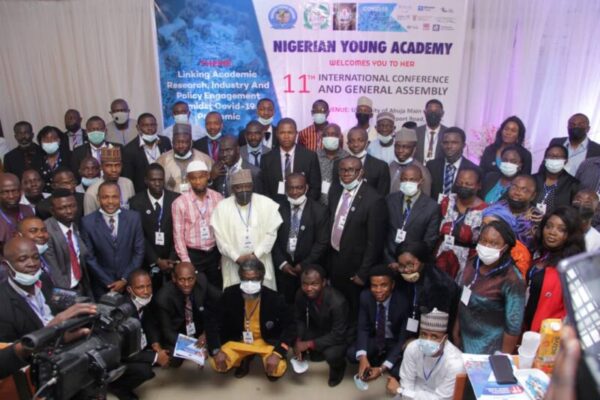
The proportion of Nigerian students and researchers in Science, Technology, Engineering, and Mathematics (STEM) averages less than 25 percent, Prof. Abubakar Sani Sambo, has postulated.
Sambo, the Vice President, Nigerian Academy of Science (NAS), made this known at the ’11th International Conference and General Assembly’ of the Nigerian Young Academy (NYA).
The conference, which held in Abuja, was themed: “Linking Academic Research, Industry and Policy Engagement Amidst COVID-19 Pandemic.”
The NAS Vice President, while speaking on the theme, noted that strategic alignment allows organisations such as research institutes, universities and industries to co-invest and share the credit for funding awards and research outputs, such as publications, while remaining independent.
Prof. Sambo said: “Research plays a crucial role in creating opportunities for individuals – enriching their lives and careers. It provides the skills needed for economic competitiveness.
“Research in higher education institutions drives the innovation our economies need. The jobs of the future depend on the innovation that university research facilitates and promotes.
“The jobs of the future depend on Nigeria doing a better job than we currently do of linking industry with research, and of turning our large-scale and very high-quality research outputs into positive benefits in people’s lives, including through commercialization.
“There should be strong linkages between industry and the higher education system, both in courses offered and in research and development leading to commercialization.”
According to him, Education as well as Science, Technology and Innovation are now at the front and centre of the development debate in Africa.
Sambo, who was once a University Vice Chancellor for nine years, noted that the disproportionate impact of COVID-19 in Nigeria, like in many other countries represents a robust opportunity for joint research with win-win benefits for scientists, especially the younger academics both in and outside the country.
He said: “For instance, collaborative work in medicine can build scientific knowledge for local and international physicians, as building strong institutions will be critical to achieving the next breakthroughs in diseases such as covid 19, Cancer and HIV/AIDS.”
He saluted the ‘laudable’ efforts of the NYA leadership who organized the conference, saying: “…I must acknowledge the efforts of NYA in this regard. It is made up of the most impressive group of young researchers that I believe will champion the cause of action for this and the next generation.”
President of the Young Academy, Dr. Abiodun Egbetokun, in an address of welcome, affirmed that their conference has given key stakeholders an opportunity to reach out to policymakers with actionable recommendations, on ways to execute and implement research findings to tackle Coronavirus in the country.
“…Earlier today, we had people talking about our culture, the role of traditional rulers, our living spaces, how even our bed spaces are designed, and things like that. So, those are the kind of specific and contextually relevant recommendations that we hope to harvest out of this conference,” he said.
Tsanni can be reached via: abdullahitsanni@gmail.com
Source:
Opinion Nigeria




